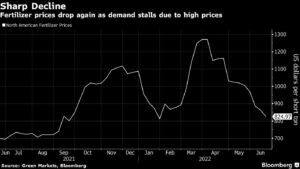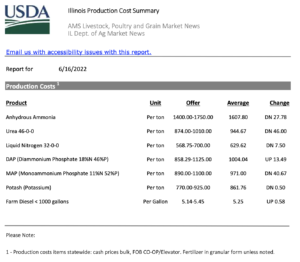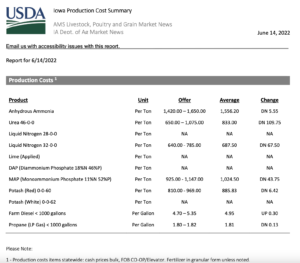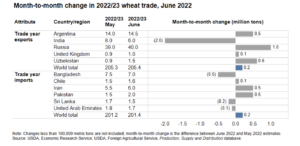President Donald Trump on Friday signed an executive order temporarily expanding the amount of beef the U.S. can import from Argentina, a move the White House says is aimed at…
Fertilizer Inventories Climb, Wholesale Prices Declining
Bloomberg writers Tarso Veloso Ribeiro and Elizabeth Elkin reported late last week that, “The fertilizer shortage that threw the agricultural sector into disarray and pushed food costs higher globally may be fading.

“Crops across the world are dependent on nutrients from Russia, one of the biggest exporters, and the invasion of Ukraine four months ago roiled markets for the crucial chemicals. Ultimately, prices soared so high that farmers halted buying — and now the market has flipped.
Fertilizer supplies are piling up from Florida to South America.
“Ships are waiting to unload and companies are struggling to reduce stocks in ports and warehouses, according to people familiar with the matter.”
Ribeiro and Elkin explained that, “Meanwhile, concerns that fertilizer supplies from Russia would be completely shut off haven’t panned out. Russian fertilizer sales are exempt from the sanctions imposed by US and EU in response to the war on Ukraine, and some shipments are entering the US, according to cargo data tracked by Bloomberg.” [Note: Recall that Russian fertilizer shipments to Brazil have also persisted].

The Bloomberg article noted that, “Wholesale fertilizer prices are declining after soaring to multi-year highs. North American prices are the lowest they’ve been since January and a closely watched index for the continent is down 35% since touching a record in late March, according to Green Markets.”

Meanwhile, Matthew Mpoke Bigg, Andrew Higgins, Thomas Gibbons-Neff and Rick Gladstone reported in today’s New York Times that, “The Russian blockade that has stopped Ukraine from exporting its vast storehouses of grain and other goods, threatening starvation in distant corners of the globe, is a ‘war crime,’ the European Union’s top foreign policy official declared Monday.
“The remarks by the official, Josep Borrell Fontelles, were among the strongest language from a Western leader in describing the Kremlin’s tactics to subjugate Ukraine nearly four months after it invaded, and with no end to the conflict in sight.”
Russia is blocking millions of tonnes of grains desperately needed across the world.
— Ursula von der Leyen (@vonderleyen) June 21, 2022
To help our partners we will mobilise an additional €600 million to avoid a food crisis and an economic shock.
This comes on top of an EU package of €3 billion for global food security.
Today’s article indicated that, “‘If it was not for the Russian war against Ukraine, there simply would be no shortage in the food market,’ [President Volodymyr Zelensky of Ukraine] said. ‘If it was not for the Russian war, our farmers and agricultural companies could have ensured record harvests this year.’
“The European Union, the United States and others are working on improving land routes for Ukraine exports, but Mr. Zelensky said that a ‘much smaller volume can be supplied via new routes, and it takes much more time.'”
Reuters writers Anita Komuves and Gergely Szakacs reported yesterday that, “Hungary has offered its territory as a possible route for Ukrainian grain exports due to the disruption of usual routes via the Black Sea caused by Russia’s invasion, Hungarian Foreign Minister Peter Szijjarto said on Monday.”
Also yesterday, Reuters writer George Obulutsa reported that, “Ukraine’s President Volodymyr Zelenskiy said on Monday that Africa was a ‘hostage’ in the war with Russia, which had contributed to rising food prices on the continent.
“African countries are acutely affected by the growing crisis, which has sent prices of grains, cooking oils, fuel and fertiliser soaring.”
With respect to Ukrainian agricultural exports, Reuters writer Natalia Zinets reported yesterday that, “Ukraine’s grain exports will increase to 2 million tonnes in June from 1.7 million tonnes in May and reach the maximum volume that Ukraine can ship by land routes, First Deputy Agriculture Minister Taras Vysotskiy said on Monday.”

And regarding grain production, Reuters writer Gus Trompiz reported yesterday that, “The impact of a heatwave on cereal crops in France, the European Union’s biggest grain producer, should be limited and was not a cause for alarm, the country’s agriculture minister said on Monday.”





